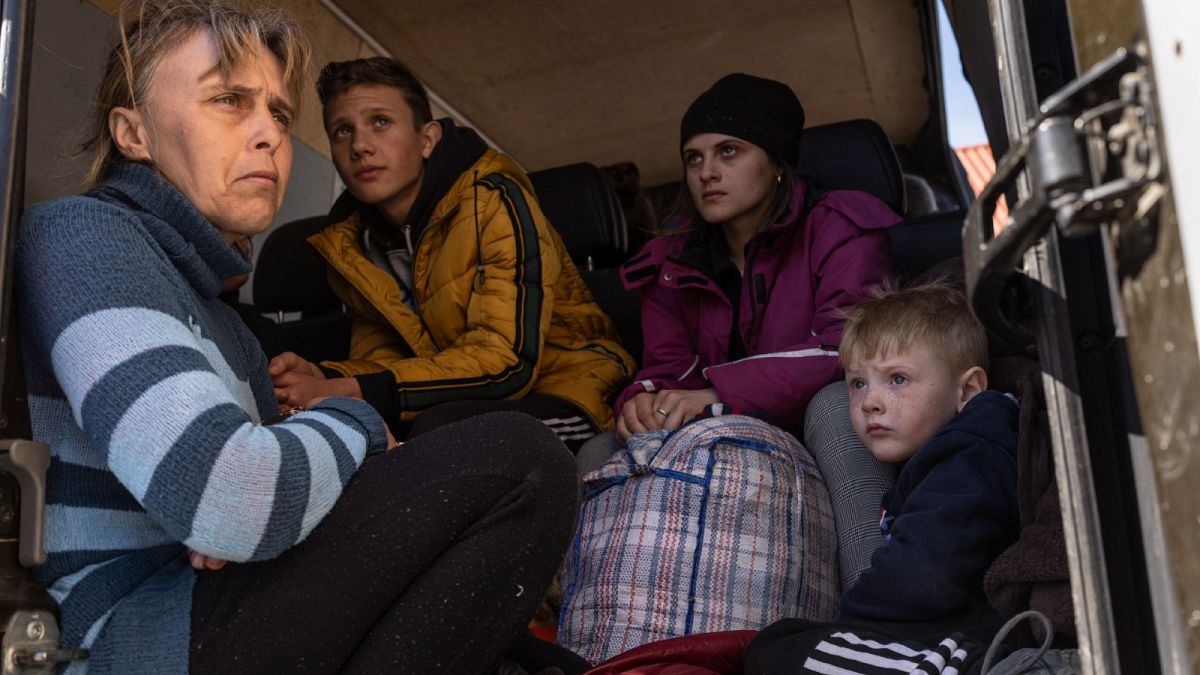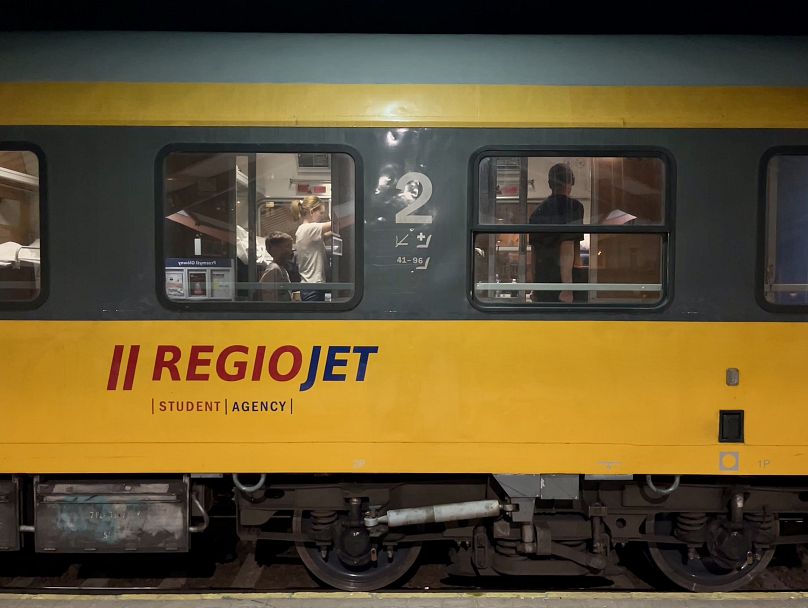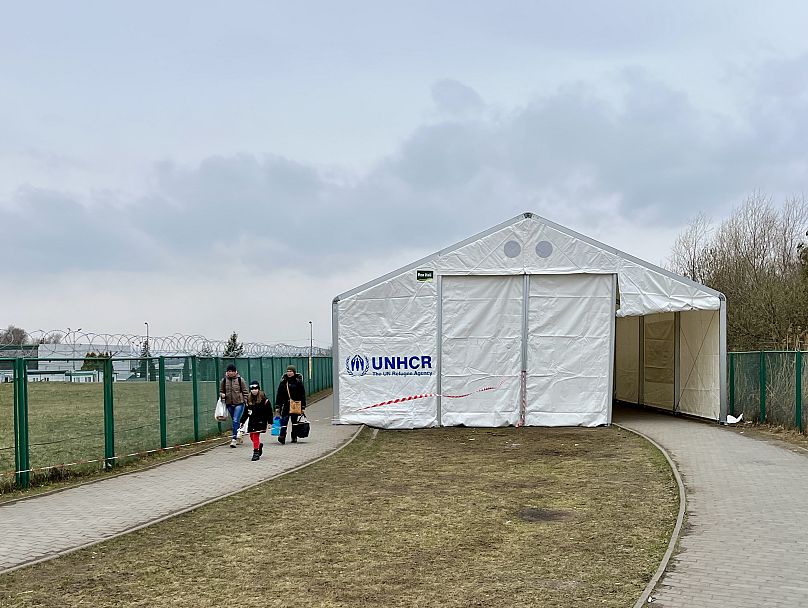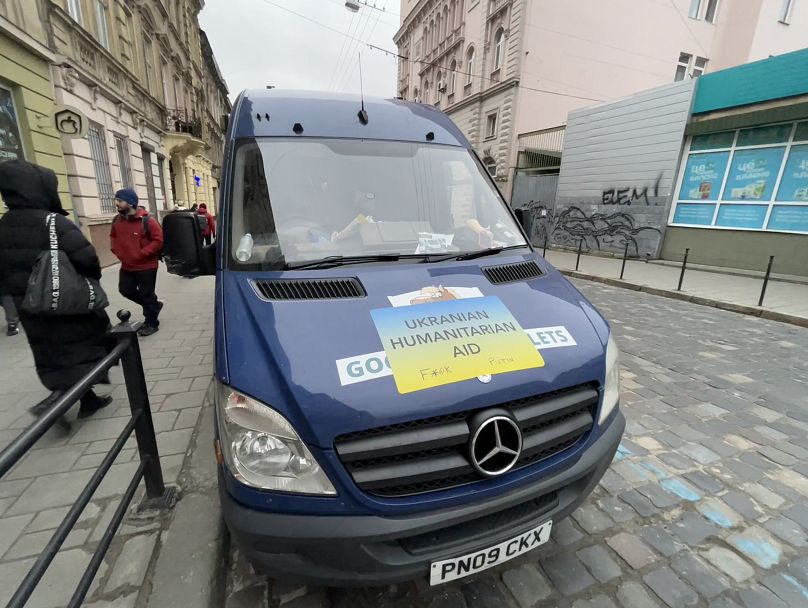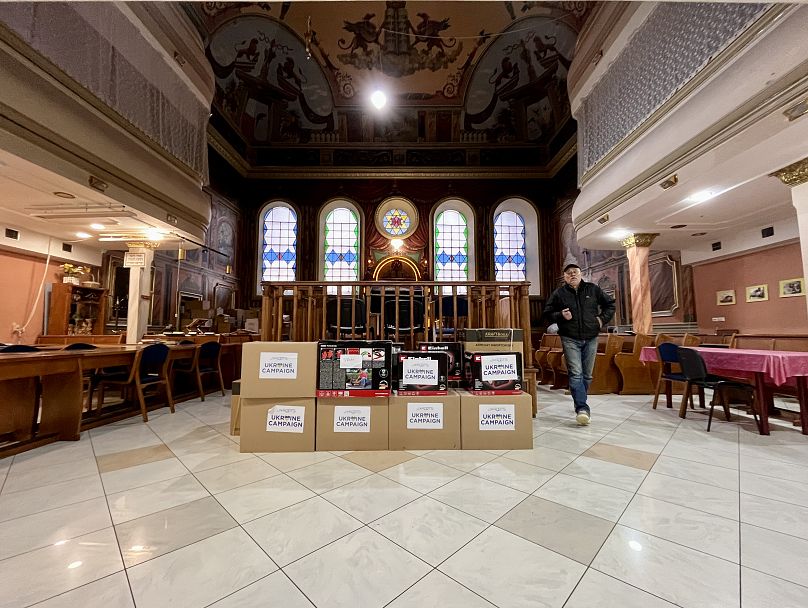“Nobody could ever expect, believe or anticipate something like this. These are horror stories — what is going on in Mariupol, what is going on in Chernihiv, in Kharkiv. It’s unimaginable.”
Only a dozen kilometres from the border with Ukraine, in Poland’s biggest refugee hub, humanitarian workers running overnight trains with aid to the country at war are worried about Russia’s announcement that humanitarian aid convoys might be legitimate targets.
When Moscow announced in March that any convoy suspected of carrying military aid into Ukraine could come under fire, many feared this would force numerous aid organisations to reduce or completely cease their activities.
But the likes of RegioJet, a privately owned company that began supplying aid on 1 March together with another Czech aid organisation, Člověk v tísni or People in Need, have not changed their minds.
“We try to not think about it. We try to stay positive,” Klára Pilová, a RegioJet attendant told Euronews.
The train takes off daily from Prague to Kyiv, making a stop in Przemyśl to drop off passengers going towards Ukraine and then continues to deliver the aid to the Ukrainian capital. On their way back they evacuate refugees that will be hosted in the Czech Republic.
Originally it operated at full capacity and transported around 800 refugees per trip, but nowadays about 350 take the train daily. So far RegioJet trains have brought in around 600 pallets worth of various aid, including food, water and other elementary supplies.
Pilová, one of the volunteers chaperoning the train between her regular shifts, said that she is concerned about not being able to adequately assist those travelling to Prague since she doesn’t speak Ukrainian or Russian.
“I’m mostly afraid of the conversation. It’s a lot of families. But two of my colleagues speak Russian so it should be fine.”
“I always wanted to help people, somehow or as much as I can, and I see this as a great chance to help someone,” Pilová said. “I feel it will make them feel better and also make me feel better for them.”
'Dismal picture of a spiralling situation'
Petr Štefan, media coordinator for Ukraine for People in Need, told Euronews that this train is just one of the means through which his organisation is helping those who found themselves in the midst of the ongoing war.
The organisation, founded in 1992 and operating in more than 30 countries worldwide, has brought in an additional 11 trains and 26 trucks worth of help – mainly food and water, but also the likes of hygiene kits, mattresses and sleeping bags.
The trains, which are handed over to the Ukrainian railways at the Przemyśl station, go directly to Kyiv and then some continue further east, to Dnipro.
From there, the contents are transferred onto trucks in order to reach areas where they are most needed — usually through UN convoys, Štefan explained.
“For example, last week we delivered aid for the second time to Sumy, just recently we delivered two trucks of aid to Sievierodonetsk — these are hot zones, there’s fighting there, still, cities that are besieged and fully encircled.”
Some of the communities they are trying to help have no access to water, electricity or gas, while places like Mariupol — where around 90% of the city was deemed to be devastated and many parts are uninhabitable — continue to suffer the most.
But help is waiting nearby, Štefan said. “Right now, we have trucks ready to enter Mariupol once it’s possible.”
While recent Western intelligence claims the latest round of bombardment is a prelude to a renewed attack on Ukraine’s east, the area close to the western borders continues to serve as a hub for most of the 7.1 million people now internally displaced as of 6 April, according to International Rescue Committee numbers.
IRC Ukraine Team Lead Nora Love said that the figure paints “a dismal picture of the spiralling situation in the east of the country.”
“There is no doubt civilians are under attack,” she said in a statement. “It seems there is no safe place for Ukraine's population to take shelter with.”
The western parts of the country will now have to face another wave of those escaping violence, Love pointed out.
“As people attempt the dangerous journey west, pressure will mount on the already fragile systems and infrastructure in cities now hosting growing populations. The humanitarian needs across Ukraine are immense,” she concluded.
And incoming aid will play a key part in making sure that those who arrive have at least basic human comforts.
Štefan said the accommodation is already completely full, while the local authorities in many places are struggling to provide essentials.
“The cities are opening auditoriums, schools, and other locations and trying to accommodate all these people,” he stated.
“So this is where we are helping, bringing mattresses, pillows or basic kitchen equipment like tea kettles to these centres.”
The organisation is planning to continue its work regardless of any escalations or attacks on its convoys, Štefan said.
“We have been in Ukraine since 2014 when the conflict in the east started. And we will simply stay for as long as we are needed. We are ready for it.”
“We are well-positioned to provide effective help to the people throughout the country and this is what we are doing right now.”
‘Delivering aid helps prevent an exodus of Ukrainians’
For Paul Grod, the president of the Ukrainian World Congress — a diaspora organisation representing 20 million Ukrainians living in more than 60 countries around the world — the fear factor coming out of Russian threats should not be underestimated, as it might prevent other organisations from working in the country.
“This is a very dangerous period that we are entering into,” Grod told Euronews, “because Russia has made it very clear that it will be monitoring and attacking supply lines.”
Grod’s organisation has also been collecting and delivering non-lethal aid. Ever since the increased threats, the UWC has taken certain precautions to avoid exposing its staff to danger, but Grod believes it is the international community that should set clear red lines.
“I think it just speaks to what Russia is trying to accomplish here. They’re trying to accomplish an exodus. And they don’t want this stuff coming in,” Grod said.
“If the Russians do attack, we’re calling Ukraine’s allies to say, that is a red line. As soon as Russia takes out a humanitarian corridor, NATO then will protect the sky across those.”
“It’s a clear cause-effect, this is what [Russian President Vladimir] Putin understands,” he explained.
And while allies like the EU or the US commiserate, the political leaders in the West are still not fully aware of the extent of the human tragedy and suffering, Grod believes.
“Nobody could ever expect, believe or anticipate something like this. These are horror stories — what is going on in Mariupol, what is going on in Chernihiv, in Kharkiv. It’s unimaginable,” he said.
“And it’s incumbent on us to tell the story of what is happening in Ukraine to those that are sitting in Berlin, Brussels or Budapest.“
In addition to leading his organisation’s humanitarian efforts, Grod has met with a number of the leaders himself, speaking with them in places from Brussels to Warsaw. But he has not been completely satisfied with the response, he said.
“We read history, but we never seem to learn from it. I’m not saying it’s an exact copy-paste, but as some people have said, history may not repeat itself but it certainly rhymes,” Grod concluded.
Across the border in Lviv, domestic organisations are now comfortably handling a lion’s share of the work, after the initial surprise at the hundreds of thousands of their compatriots sought refuge in the largest city in the west, local journalist Tymur Zakriyaev told Euronews.
“Maybe the first three days or so were a shock. This is the first time this is happening — a serious invasion from all sides. People didn’t know how to act,” he said.
But in the meantime, the authorities have opened up a number of humanitarian centres all around the district, and those internally displaced are being hosted everywhere from the big cities to the small villages in the Lviv region, but also in the nearby regions of Zakarpattya and Ivano-Frankivsk.
A number of domestic organisations, including various religious communities, have all pitched in to help.
Most importantly, people have been welcomed with open arms, Zakriyaev said.
“I didn’t expect them to be welcomed that well. People were shocked, and I thought that some people would become aggressive due to the war,” he explained.
“But what I saw is that people coming from Mariupol and other places [in the east] say they feel at home here.”
“And I also noticed that many people are now returning from Europe here to wait for their cities to be liberated and it would be not dangerous to go there. Meanwhile, they live in the villages here in western Ukraine. It’s better to be in your own homeland,” Zakriyaev stated.
“We all decided to stick together and do everything we can. If you don’t know how to fight, you can do other things to help. And people are doing just that.”
